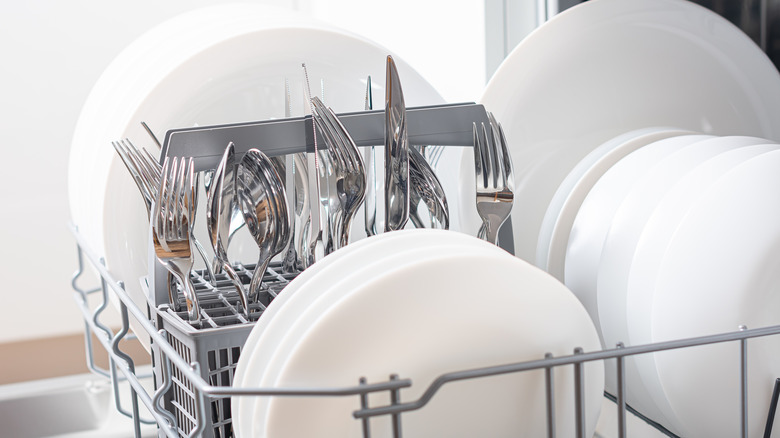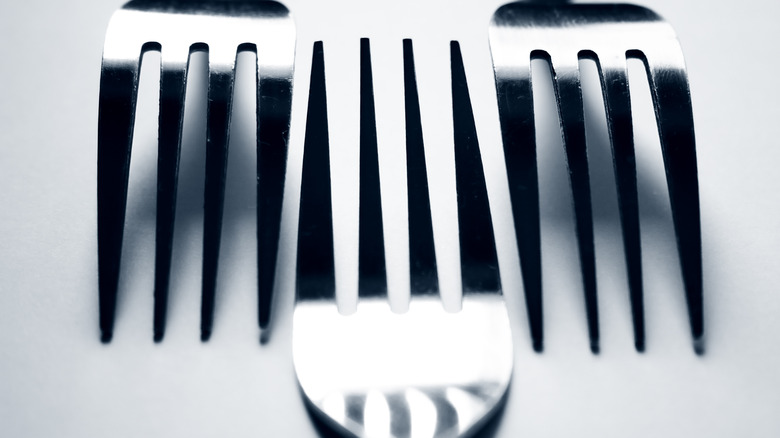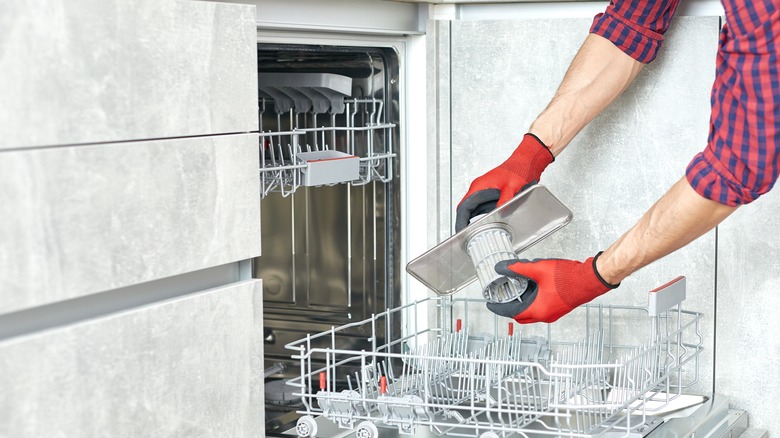The Dishwasher Trick To Getting Squeaky Clean Silverware
If you really want to ensure that your dishwasher is cleaning silverware properly, there are certain dishwasher rules you should try to follow. Always remember to pre-wash your silverware to break up tough stains and put utensils in separate baskets to ensure full sanitation. The suggestions are endless, and with every dishwasher being so different in terms of its power and abilities, it's never a guarantee that any tip will work as well as expected.
To understand why some folks are having a hard time getting their silverware properly cleaned, let's dig into one great debate about cleaning silverware: Should the handles of your silverware be pointed up or down? Well, if you want to get your utensils as clean as possible, the answer is actually neither.
To reach every dirty spot on your silverware, you should be alternating the direction of the utensils that you stick into the dishwasher. This prevents the prongs of forks and ridges of knives from clumping together and making it more difficult to get every little crevice truly clean. If you're not convinced, let's dig further.
The great utensil debate
Now, some people have some reservations about this alternating silverware method. Some argue that having the blades of knives sticking up in a dishwasher is a safety hazard, while others say that putting your hand on the part of the silverware people put their mouths on is unsanitary. Others argue still that having the handles of silverware sticking up brings them closer to the dishwasher's jets, which makes them all cleaner.
Since some silverware can be pointy, we encourage you to practice caution in the vicinity of your dishwasher if you choose to alternate your silverware, but we still stand by this method as being the best option. If you want to get technical, some users on Reddit suggested putting forks and knives with the sharp edges down to avoid injury while still leaving the spoons in the opposite direction. This allows for the dishes to get cleaner without risk of injury. Others still think you should leave forks with the prongs up to ensure they get properly cleaned, while still leaving your knives down to avoid potential injury from the blade. At the end of the day, exactly how you organize your dishwasher is entirely up to you, but alternating could make your utensils much cleaner.
Other ways to ensure proper cleaning of your silverware
Now if you've given the alternating method a shot and your silverware is still not getting as clean as you'd like it to be, we have a few other ideas in mind to change this. To start, you might want to check your dishwasher's filter. Dirty or clogged filters can make it hard to ensure all your dishes are getting clean, and you have to clean the filters in many dishwasher models after long periods of use. You'll just need a brush and some soapy water to get the job done, so don't be intimidated by this possibility. Also keep in mind that not every dishwasher filter needs to be manually cleaned, so know what your model needs before going scrounging around for this filter.
If the filter is not the issue, it might just be your detergent. Experiment with different types of liquids, powders, and rinse aids if you're not happy with how clean your dishes are. Another possibility might be the temperature of your water. The water in your dishwasher should be hot enough to eliminate the bacteria in your dishes; if it's not, it's time to make a change.
Whatever the issue might be, always start with simple fixes like switching up the way you load your silverware. Your dishwasher can do a lot of unexpected things, and sometimes the problem is simply in the loading process.


